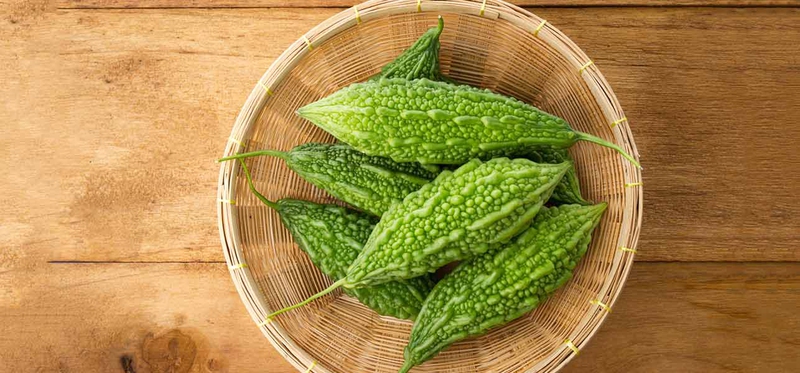Bitter melon, also referred to as bitter squash or bitter gourd is a kind of medicinal fruit that is found in Africa, Asia and some parts of the Caribbean. Its taste is extremely bitter but it has multiple health benefits that you can derive by adding it to your diet.

Nutrition Facts of Bitter Melon
Bitter melon is a rich source of nutrients such as vitamin C, vitamin A, vitamin K, phosphorus and iron. It also contains biologically active antioxidants and phytonutrients including glycosides, alkaloids, phenolic acids, insulin-like peptides and certain kinds of anti-inflammatory proteins and steroids. Studies have found specific flavonoid and phenolic compounds in bitter melon that make it a successful anti-cancer and anti-diabetic food.
Bitter Melon Benefits and Effects on Your Body
It helps in normalizing levels of blood sugar: Findings from animal and human studies have shown that a concentrated extract of bitter melon have a hypoglycemic effect, implying that it helps in lowering blood sugar levels and in regulating the utilization of insulin by the body. Extract of bitter melon acts similar to the naturally produced insulin in many ways. Complications and symptoms of diabetes that extract of bitter melon can manage are:
High blood glucose levels and insulin resistance
Kidney damage (nephropathy)
Disorders of the eyes including glaucoma or cataracts
Menstrual changes and irregularities of the hormone in females
Damage to the blood vessels and heart complications
Drink one cup juice of bitter melon daily. Stop its use if you experience any symptoms of fever, diarrhea or abdominal pain. Monitor your blood sugar regularly and make adjustments under the guidance of your physician.
Helps fighting viral and bacterial infections: According to research, several types of antiviral and antibacterial agents are found in bitter melon. These agents have the capability to lower the susceptibility to infections such as Helicobacter pylori (a common bacterium that is responsible for causing stomach ulcers in persons with low immunity) and HIV. Additional studies have demonstrated that bitter melon contains anthelmintic agents, which are a kind of anti-parasitic compounds, which help in the expulsion of parasitic worms from your body.
Improve liver and digestive health: Extract of bitter melon can help in the reduction of intestinal and stomach disorders, prevention of liver disease and improvement of liver function, reduction of symptoms of colitis are just more of bitter melon benefits. Bitter melon acts as a natural laxative, thereby, helping in relieving constipation. It helps in digestion, improves the functioning of gallbladder and reduces fluid retention.
Prevent cancer: Various studies have shown the efficacy of bitter melon in managing or preventing different kinds of cancers including lymphoma, lymphoid leukemia, melanoma, choriocarcinoma, skin tumor, breast cancer, prostatic cancer, and bladder cancer, cancer of the larynx and tongue and Hodgkin’s disease.
Reduce respiratory symptoms and disorders: Bitter melon increases detoxification, improves blood flow, lowers inflammation and reduces damage by free radical, thereby, preventing common conditions such as colds, coughs or influenza. Traditionally, Chinese medicine uses juice of bitter melon to treat bronchitis, dry coughs and sore throats. Current studies demonstrate that juice, seeds and fruit of bitter melon are beneficial in preventing coughs, respiratory illnesses, and production of mucus and allergies to certain foods.
It helps in treating skin inflammation and wounds: Anti-inflammatory chemicals in bitter melon help in the treatment of skin conditions including acne, psoriasis and eczema-another of the bitter melon benefits. Due to the antibacterial properties of bitter melon, traditionally and still today it has been applied topically for the treatment of abscesses and wounds. You can try soup of bitter melon for relieving any of these conditions. An additional benefit of bitter melon is that it purifies blood.
Prevent heart disease and obesity: Bitter melon extract has been found to have therapeutic properties in treating symptoms associated with metabolic syndrome and heart disease such as high blood pressure and high cholesterol. According to experimental clinical and animal studies bitter melon is found to be beneficial in the prevention of obesity by inducing and mediating fat and lipid metabolizing processes and gene expressions, which control body weight and appetite and by reducing inflammation.
It energizes you naturally: Regular consumption of juice of bitter melon helps in the improvement of stamina and energy levels of a person and also improves sleeping patterns.
Break down kidney stones: Bitter melon helps in getting rid of the painful kidney stones by breaking them down naturally. It also reduces high acid content that helps in the production of kidney stones. Create a tea by infusing bitter melon powder with water. The flavor of this tea is nutty and it does not need sweetening.
It is a rich source of vitamin K: Vitamin K aids in clotting of blood, contributes to healthy bones and acts as an anti-inflammatory. Those people who are suffering from arthritis can experience reduced pain and inflammation in their joints by increasing their intake of vitamin K. The addition of bitter melon to your diet satisfies your body’s daily recommended need for vitamin K. Moreover, bitter melon is a rich source of dietary fiber.
It helps in increasing immunity: Bitter melon benefits include a better immune system, which is crucial for fighting off potential diseases and infections.
Ways to Include Bitter Melon in Your Diet
Bitter melon can be cooked and eaten or ingested in tablet/extract form.
You can stir fry it with garlic, potatoes, onion and chili, till there is reduction in some of its strong smell.
You can take up to 100 ml of fresh juice of bitter melon one time daily. You can dilute the fresh juice of bitter melon with small amount of fresh veggie or fruit juice or you can add some amount of honey.
The video below shows more about bitter melon and one delicious recipe:
View All Comments /Add Comment